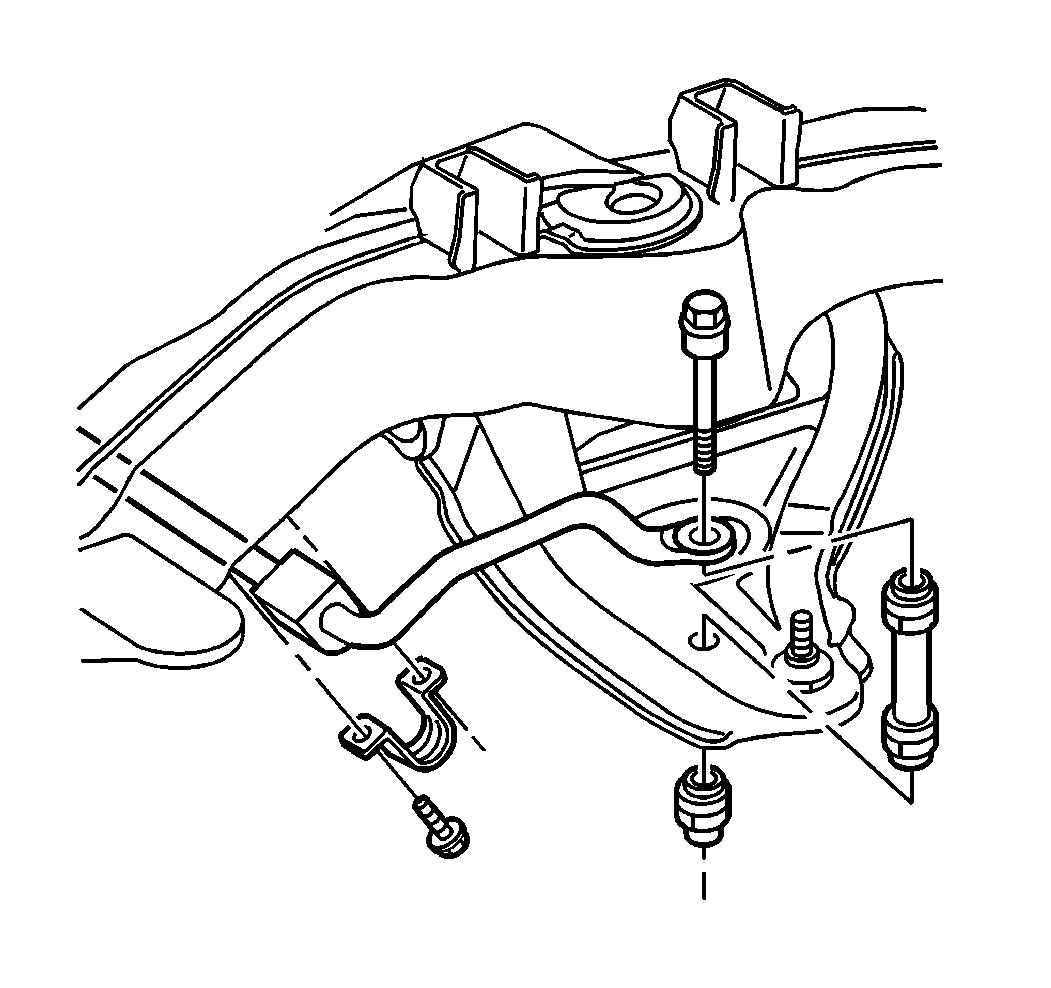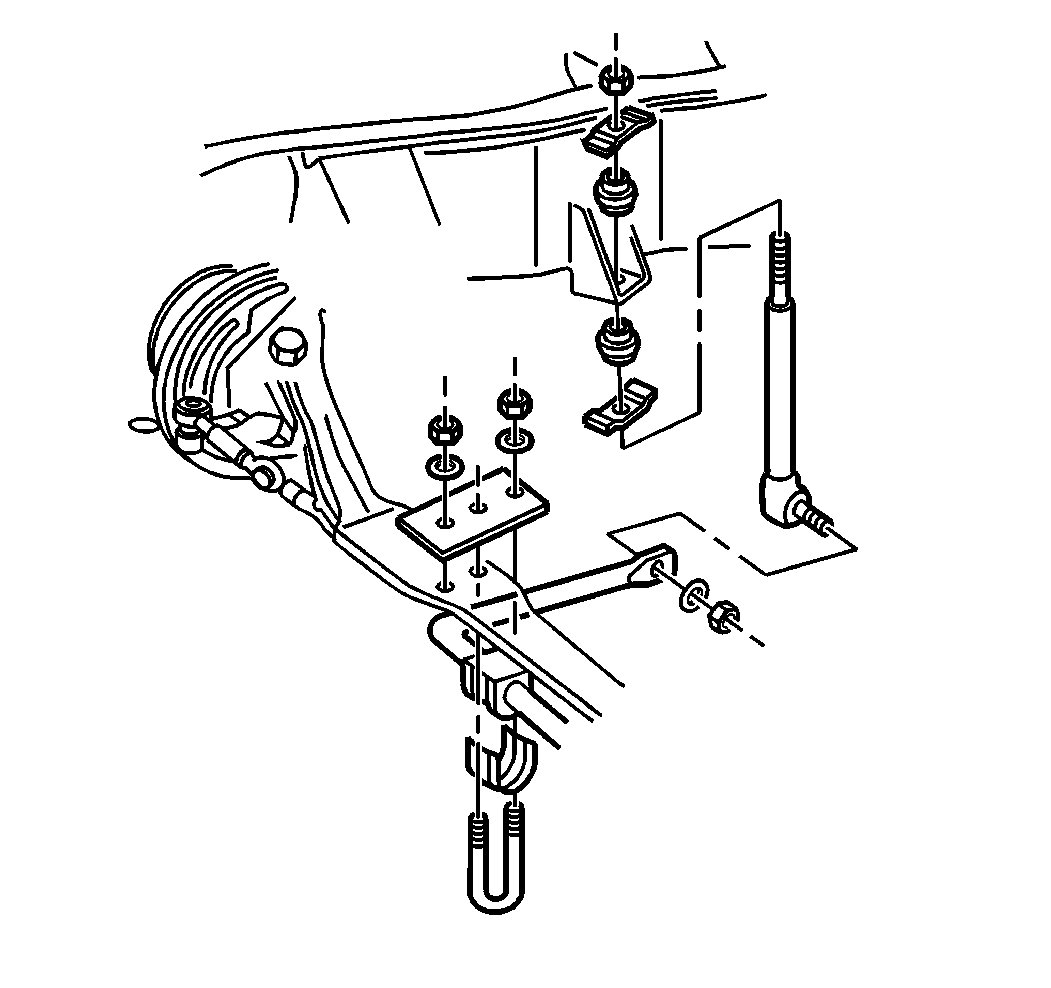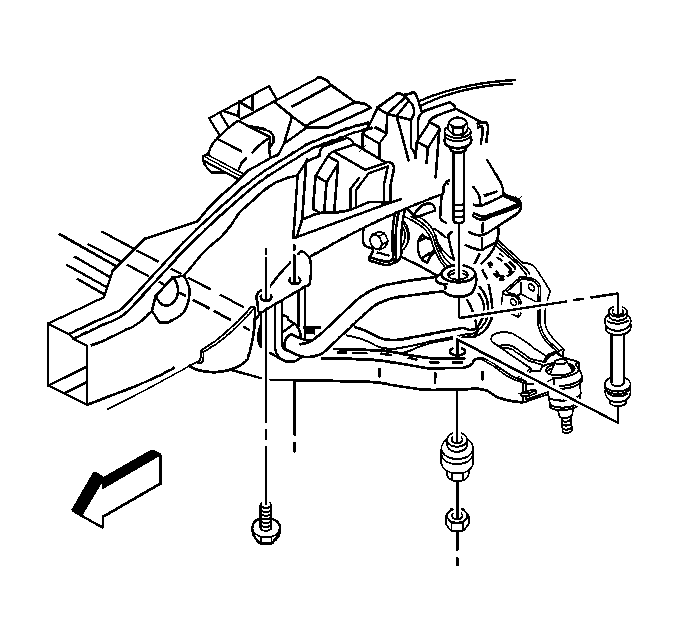Stabilizer Shaft Replacement 2WD-All Except C3500HD
Removal Procedure
- Raise the vehicle. Support the vehicle with safety stands.
- Remove the nut from the link bolt assembly.
- Remove the link bolt.
- Remove the spacer assembly.
- Remove the bolts.
- Remove the bracket.
- Remove the stabilizer shaft.
- Remove the rubber bushing.
- Inspect all of the parts for wear and damage.

Important: When you remove parts from the right side and the left side of the vehicle, keep the parts separated.
Installation Procedure
- Install the rubber bushings to the stabilizer shaft.
- Install the stabilizer shaft.
- Install the brackets over the bushings and the stabilizer shaft.
- Install the bolts to the brackets and the frame.
- Install the spacer assembly.
- Install the link bolt assembly.
- Install the nuts.
- Tighten until the nut meets the end of the bolt threads for torque value.
- Tighten the nut to 18 N·m (13 lb ft).
- Lower the vehicle.

Important: Place the bushings on the stabilizer shaft with the slits facing toward the front of the vehicle.
Tighten
Tighten the bolts to 33 N·m (24 lb ft).
Notice: Use the correct fastener in the correct location. Replacement fasteners must be the correct part number for that application. Fasteners requiring replacement or fasteners requiring the use of thread locking compound or sealant are identified in the service procedure. Do not use paints, lubricants, or corrosion inhibitors on fasteners or fastener joint surfaces unless specified. These coatings affect fastener torque and joint clamping force and may damage the fastener. Use the correct tightening sequence and specifications when installing fasteners in order to avoid damage to parts and systems.
Tighten
Stabilizer Shaft Replacement C3500HD
Removal Procedure
Tools Required
J 6627-A Wheel Stud and Tie Rod Remover
- Raise the vehicle. Support the vehicle with suitable safety stands.
- Remove the tire and wheel assembly. Refer to Wheel Removal in Tires and Wheels.
- Remove the nut and the washer.
- Remove the stabilizer shaft from the stabilizer link. Using the J 6627-A , separate the stabilizer link from the stabilizer end.
- Remove the nuts, the washers, the clamp bolts, and the clamps.
- Remove the stabilizer shaft from the axle.
- Remove the insulator from the stabilizer shaft.
- Remove the nut, the retainer, and the insulator.
- Remove the stabilizer link from the frame bracket.

| • | Pull the link from the bracket. |
| • | Another insulator and retainer will come off of the link. |
Installation Procedure
- Install the stabilizer link to the frame bracket.
- Install the insulator, the retainer, and the nut.
- Install the stabilizer shaft to the front axle.
- Install the insulators onto the stabilizer shaft.
- Install the clamps, the clamp bolts, the washers, and the nuts.
- Install the stabilizer shaft to the stabilizer link.
- Install the washer and the nut.
- Install the tire and wheel assembly. Refer to Wheel Installation in Tires and Wheels.
- Lower the vehicle.
Notice: Use the correct fastener in the correct location. Replacement fasteners must be the correct part number for that application. Fasteners requiring replacement or fasteners requiring the use of thread locking compound or sealant are identified in the service procedure. Do not use paints, lubricants, or corrosion inhibitors on fasteners or fastener joint surfaces unless specified. These coatings affect fastener torque and joint clamping force and may damage the fastener. Use the correct tightening sequence and specifications when installing fasteners in order to avoid damage to parts and systems.

| 1.1. | Slide a retainer and an insulator onto the link. |
| 1.2. | Insert the link into the proper hole in the frame bracket. |
Tighten
Tighten the nut until the distance between each retainer is 38 mm
(1.5 in).
Tighten
Tighten the nuts to 29 N·m (21 lb ft).
Tighten
Tighten the nuts to 68 N·m (50 lb ft).
Stabilizer Shaft Replacement S4WD
Removal Procedure
- Raise and support the vehicle. Refer to Lifting and Jacking the Vehicle in General Information.
- Remove the wheel and tire assembly. Refer to Wheel Removal in Tires and Wheels.
- Remove the stabilizer link nuts.
- Remove the stabilizer link bolts.
- Remove the stabilizer link spacer assemblies.
- Remove the stabilizer shaft clamp bolts.
- Remove the stabilizer shaft clamp.
- Remove the stabilizer shaft.
- Remove the stabilizer shaft insulators.
- Inspect all of the parts for wear and damage.

Important: Remove the parts from the right front and the left front of the vehicle. Keep the parts separated.
Installation Procedure
- Install the insulators to the stabilizer shaft. Face the slit in the insulator forward.
- Install the stabilizer shaft to the frame and to the lower control arm.
- Install the stabilizer shaft clamp to the insulator.
- Install the stabilizer shaft clamp bolts to the frame.
- Install the stabilizer link spacer assemblies.
- Install the stabilizer link bolts.
- Install the stabilizer link nuts.
- Install the wheel and tire assembly. Refer to Wheel Installation in Tires and Wheels.
- Lower the vehicle.

Notice: Use the correct fastener in the correct location. Replacement fasteners must be the correct part number for that application. Fasteners requiring replacement or fasteners requiring the use of thread locking compound or sealant are identified in the service procedure. Do not use paints, lubricants, or corrosion inhibitors on fasteners or fastener joint surfaces unless specified. These coatings affect fastener torque and joint clamping force and may damage the fastener. Use the correct tightening sequence and specifications when installing fasteners in order to avoid damage to parts and systems.
Tighten
Tighten the bolts to 33 N·m (24 lb ft).
Tighten
Tighten the nuts to 18 N·m (13 lb ft).
